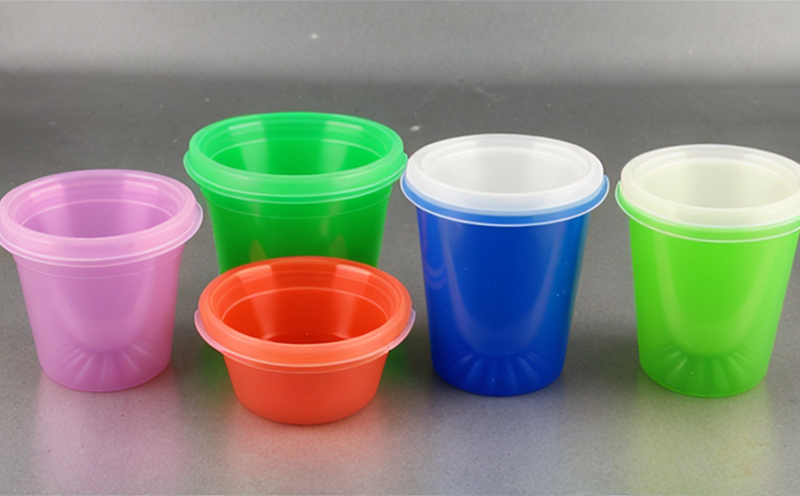ISO 527 Tensile Strength Testing of Disposable Plastics
The ISO standard ISO 527 specifies the mechanical testing methods for plastics. This service focuses on the tensile strength testing of disposable plastics, a critical parameter that ensures product reliability and compliance with regulatory requirements.
Tensile strength is a measure of how much stress a material can withstand before it breaks or stretches to its maximum length. For disposable plastics, this test assesses the integrity of materials used in single-use products such as medical devices, food packaging, and consumer goods.
The testing process involves subjecting a sample to tensile forces until fracture occurs. The force required to cause failure is measured and reported in units like Newtons per square millimeter (MPa).
- Materials tested include polyethylene (PE), polypropylene (PP), polystyrene (PS), and other thermoplastics.
- The test can be conducted on various shapes such as bars, films, or sheets, depending on the product design.
Specimens are prepared according to ISO 527 guidelines, ensuring uniformity in testing. The sample dimensions must adhere to specific tolerances defined by the standard to ensure accurate and comparable results.
| Sample Type | Dimensions (mm) |
|---|---|
| Tension Specimen | 10 × 25 mm |
| Compressive Specimen | 150 × 12.5 × 4 mm |
The testing machine used for this service is equipped with a high-precision load cell capable of measuring forces up to 5 kN, ensuring precise readings even at low loads.
The test procedure involves placing the specimen in the grips of the tensile tester. The machine then applies controlled stress until the sample reaches its breaking point. The force and elongation are recorded continuously throughout the test.
Upon completion, a detailed report is generated containing essential parameters such as:
- Specimen dimensions
- Load at fracture
- Elongation at break
- Modulus of elasticity
The results are compared against the specified limits for the material type. Compliance with ISO 527 ensures that manufacturers meet international standards, enhancing product quality and reliability.
Why It Matters
Tensile strength testing of disposable plastics is essential for several reasons:
- Regulatory Compliance: Many countries have strict regulations regarding the safety and performance of single-use products. ISO 527 ensures that manufacturers meet these standards.
- Product Integrity: Ensures that materials used in disposable plastics are robust enough to withstand typical use conditions without failure.
- R&D Optimization: Provides valuable data for product development and improvement, helping engineers refine material selection and manufacturing processes.
The test results can also influence the design of products such as surgical gloves, food containers, and packaging materials. Understanding the tensile strength helps in optimizing these designs to balance functionality with cost and environmental impact.
For quality managers and compliance officers, this service offers a reliable method for ensuring product safety and performance. It also supports the procurement process by providing data on material suitability and performance.
Why Choose This Test
Selecting ISO 527 tensile strength testing offers several advantages:
- Accurate Testing: The standard provides clear guidelines for specimen preparation and testing procedures, ensuring consistent results.
- International Recognition: Compliance with ISO standards is recognized globally, enhancing the credibility of your products in international markets.
- Data Validation: The test helps validate claims about product performance, providing a scientific basis for marketing materials.
The service offered by our laboratory ensures that you receive accurate and reliable results. Our team of experts uses state-of-the-art equipment to conduct these tests, ensuring the highest level of precision.
We also provide comprehensive reporting services, offering insights beyond just tensile strength. This includes modulus of elasticity, elongation at break, and other critical mechanical properties.
Use Cases and Application Examples
| Use Case | Description |
|---|---|
| Medical Device Packaging | Testing ensures that packaging materials can withstand sterilization processes without compromising product integrity. |
| Surgical Gloves | Evaluates the strength and durability of gloves, critical for healthcare professionals' safety. |
| Food Packaging | Ensures that packaging materials are robust enough to protect food products during transportation and storage. |
The following list highlights some common applications:
- Evaluating the durability of single-use medical supplies like syringes, IV sets, and catheters.
- Assessing the strength of disposable containers for food, beverages, and pharmaceuticals.
- Testing the robustness of packaging used in consumer goods to ensure they can withstand shipping and handling.
In each case, tensile strength testing plays a crucial role in ensuring product safety, compliance with regulations, and overall quality.





